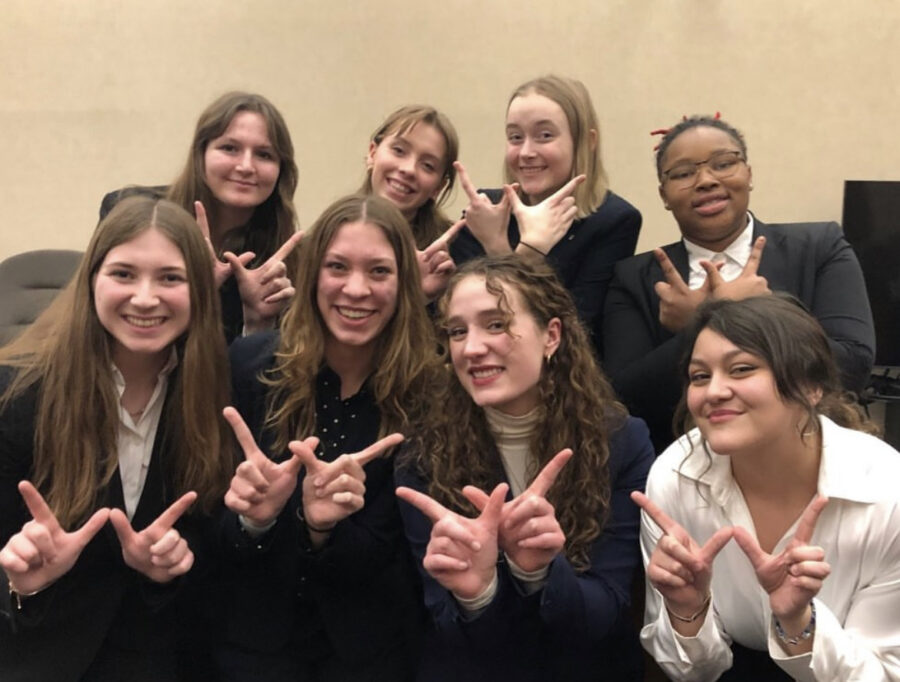Behind the Scenes: Mock Trial
BSM’s Mock Trial team is a highly decorated group with many successes over the years it’s been running. Students may see team members parading around in suits or posters on the walls about knee injuries – which may cause questions. So what really is Mock Trial?
Mock Trial is a Minnesota State High School League competitive activity, where the state is given a case and teams have to prepare both sides of their argument as if they were defending in a real court. This year, the case is about a swimmer who tore their ACL (hence the multiple knee joke posters) that is based on a real case. It is a civil case, so there are two sides: the plaintiff and the defense. Mock Trial combines public speaking with law, along with elements from many other areas. “Mock Trial is the combination of debate and law and speech. If you were to have the three together and theater if they all had a baby, it would be Mock Trial,” Mock Trial Advisor Mary Murray said.
The competitions, though they may seem confusing on the surface, are relatively straightforward. Every school’s team must be prepared to present both sides of the case, and are assigned either plaintiff or defendant a few days prior to the competition. Each side has three lawyers and three witnesses that prepare their parts by memorizing scripts during practice, complete with a timekeeper and a bailiff to keep order. A lawyer presents a five-minute opening statement, and the witnesses follow by presenting their three directs, which is the way they tell the story about their side of the case.
Following that, the other team has an opportunity to present three crosses, where they try to negate the information from the first team and prove them wrong. This repeats for the other side, each team prepares a seven minute closing argument, and the judges choose who had the best argument. “And then once that’s decided they usually tell us what the scores are. And then you know whether you have won or not,” Murray said.
To ensure their presentation of their argument is as strong as it can be, they practice multiple times a week from October to February. Besides constant practicing, there are a few strategies the team follows to put their best foot forward.
“…because Mock Trial is scored on points, that’s where that theater and speech part kind of comes in [the] delivery of it, because you have to be able to take pauses and you have to be theatrical in ways, but we’re not allowed to use costumes necessarily. So we do some subtle things like the color of our outfits. Like we might have like a police officer wear blue, you know some things like that,” Murray said.
The team has been to state five times in the ten years Murray has been advisor, and four of those times have been in the last five years. This helps the team’s culture, as their past successes have increased their spirits. “We have a little bit of ego. We have a lot of confidence,” senior captain Parker Morgan said.
To reach these achievements, the team puts in plenty of time and effort to make their case as strong as possible. “…when you’re in Mock Trial, it’s almost as intense as a winter sport in the sense where you’re practicing a minimum of six hours a week and a maximum of maybe 12-14 hours,” senior captain Francesca Lichtenberger said.
The team’s past has helped them come together to create a strong team culture. “I would say we’re all definitely very ambitious and determined people but we also have a lot of fun. And so I feel like it’s a nice balance between good work ethic, but also just like bonding and collaborating as a team. So it’s pretty fun. We’re a little bit weird, but it’s fun,” Lichtenberger said.
One unique aspect of this year’s team is that there is only one male on the entire roster. The rest of the team (including the entire varsity roster) is all either women or non-binary members. “We’re very much like a big family. Like there’s a lot of jokes…it seems from outside [a] very close team and it is, but there’s a lot of internal joking with each other,” Morgan said.
To keep this fun family culture going, the team embarks on many field trips and participates in bonding activities. “We’ve done tie dye T shirts, we’ve done mystery activities…we’ve done breakout rooms like that stuff. And then we went to the capital, which was fun,” junior team member Makayla Shiek said.
Mock Trial has helped the members with their confidence in public speaking, and shows the importance of collaboration with teammates. Though the competitions may appear nerve-racking, the members have proved that the benefits outweigh the fear. “[Mock Trial] has definitely helped me since my freshman year. I mean, even before I got my driver’s license, I had limited [an] opening statement to a retired member of the Minnesota Supreme Court…I feel like especially in your beginning of Mock Trial [it’s] like sink or swim, you just gotta do it. And so [it] definitely helped me get over a lot of my anxiety or in public speaking,” Lichtenberger said.
The benefits of Mock Trial extend far beyond high school. Ronan Brew, a 2020 BSM alum, went on to Duke University and continued his involvement in Mock Trial. “His freshman year at Duke, he was on their second team for mock trial. But then as a freshman he got pulled up to play on their varsity team and he went to Nationals. And so he’s one of the really high achievers that we’ve had,” Murray said.






































![Teacher Lore: Mr. Hillman [Podcast]](https://bsmknighterrant.org/wp-content/uploads/2025/03/teacherlorelogo-1200x685.png)




